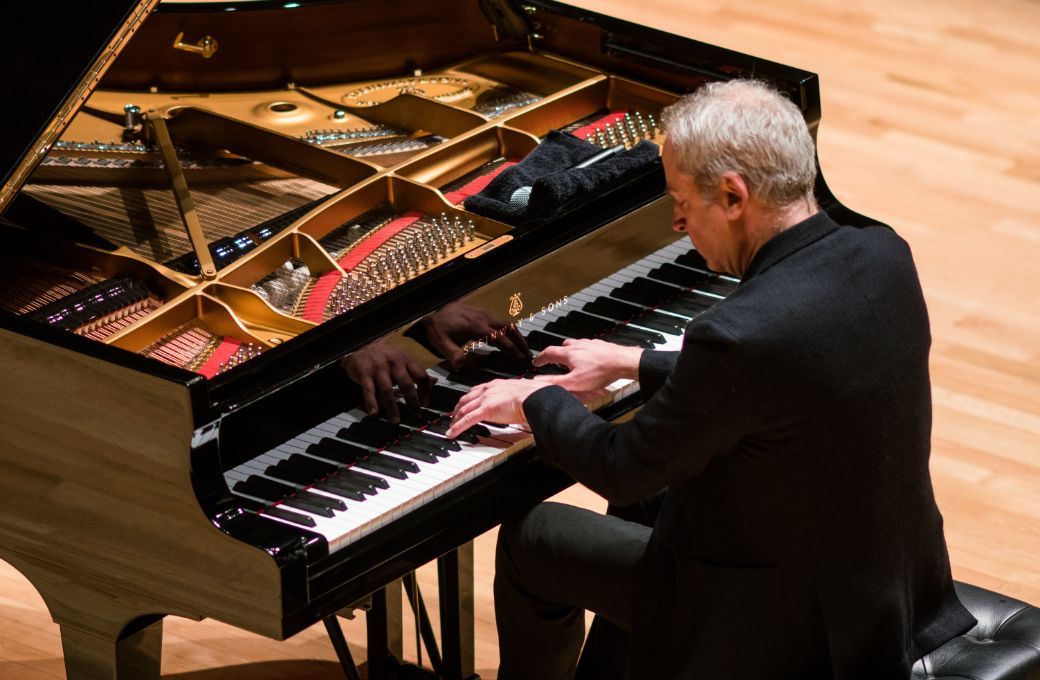Jeremy Denk’s appearance at Oberlin College’s Artist Recital Series saw the pianist present a recital ripe with intriguing discovery and sensitive interpretation. It was also a homecoming of sorts for Denk, an Oberlin alumnus who graduated in 1990 with degrees in both piano performance and chemistry. Denk has a gift for devising innovative and thought-provoking programs, almost like concocting a particularly iridescent solution in a chemistry lab. The first half was devoted to largely overlooked works by female composers, with pieces from living figures interwoven with those from the past. Ten short works – conceived in contrasting or complementary pairs – traversed a wide swath of styles and ideas.

The program notes likened the selections to a musical analog of Judy Chicago’s iconic installation The Dinner Party, in which women throughout history are quite literally given a seat at the table. A Romance by Clara Schumann opened wistful and longing, a deeply lyrical essay only to be countered by the acerbic, punctuated Cuban rhythms of Tania León’s Rituál. The innocent charm of Chaminade’s The Flatterer (often known by its Spanish title La Lisonjera, apposite as it takes the style of a Spanish serenade) was humorously answered by the angst of Missy Mazzoli’s somber Heartbreaker.
Only about a minute long, I was particularly struck by Ruth Crawford Seeger’s Piano Study in mixed accents. An uncompromising exercise in perpetual motion spanning the length of the keyboard, it echoed the final movement of Chopin’s B flat minor piano sonata, though its percussiveness even seemed to anticipate the Ligeti etudes. Phyllis Chen, the youngest composer on the program – and another Oberlin alum – was represented with her 2019 piece Sumitones. The bare, sparse textures created an almost mystical soundscape, building to an astringent climax. Amy Beach’s Dreaming was a gem with its gorgeous melody and suitably meditative end. This is repertoire Denk clearly believes in, and he proved to be a keen advocate and guide through the unfamiliar.
The latter half was devoted to a pair of major scores which Denk referred to as love letters to Clara Schumann: one by Brahms, one by her husband, Robert. Ironically, programming these two pianistic pinnacles seemed to, at least partially, upend Denk’s proselytizing for the neglected works that preceded which, by comparison, seemed like mere trifles. Brahms’ final piano work, the Klavierstücke, Op.119, was written with Clara in mind. The first selection in particular embodies the autumnal yearning and reflection that wanders through the composer’s late outpouring of piano music. The inner pieces were given graceful readings under Denk’s hands, contrasted by the ebullience and triumph of the closing Rhapsody.
Though dedicated to Liszt, Schumann’s Fantasy in C major was at its heart an expression of his then forbidden love for Clara. The opening was flowing and rhapsodic, akin to drinking from a firehose in its gushing of emotion, certainly a non plus ultra of the Romantic repertoire. Denk gave it a commanding workout, playing with free-falling abandon, though at times sacrificing some clarity. The central march ramped up the vigor, aided by incessant dotted rhythms and a manic coda. The final reverie occupied a similar mood to the Beach piece, though substantially more developed in the rapturous poetry that concluded the program. As an encore, Denk offered Joplin’s Heliotrope Bouquet, authentically capturing both its charm and underlying melancholy.


